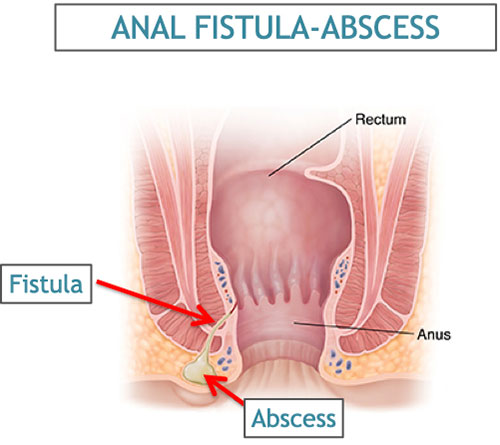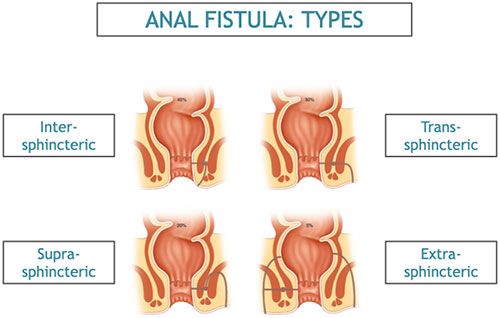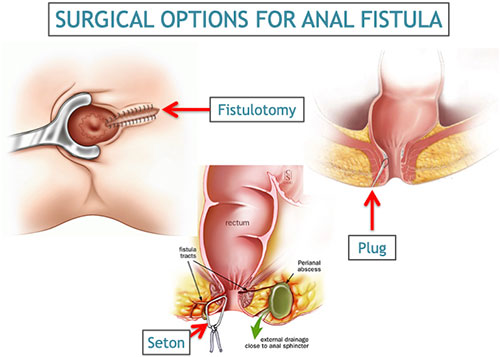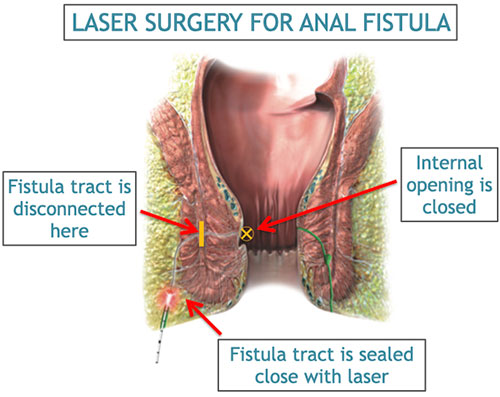ANAL FISTULA
What is an Anal Fistula?

Anal fistula is a connection between the anal canal and the skin around the anus. It usually forms as a result of an abscess or infection in the area. Fistulas usually persist for a long time and become a nuisance with recurring episodes of pus discharge and pain. They are usually felt as a small swelling near the anus that releases pus and won’t go away.
How do anal fistulas occur?

With constipation, a hard bowel movement can erode the lining in the anal canal, resulting in infections of small glands in the anal lining. This results in abscess/ collection of pus that can slowly increase or recur over time. Eventually, the pus finds its way through or around the sphincter muscles of the anus and out through the skin around the anus. Due to the persistent infection, the lining of this tract perisists and causes recurring episodes of pus discharge and pain, which is a fistula. The following factors can increase the likelihood of developing a fistula:
- straining to have a bowel movement when you are constipated
- waiting too long to have a bowel movement
- having less fibre in diet
- insufficient water intake
- low immunity states: diabetes, steroid intake, other diseases.
What are the symptoms of anal fistulas?
Symptoms of anal fistula include:
- pain near the anal region
- pus discharge with relief of pain
- recurrence of this cycle in weeks/ months
- a swelling noted around the anus, which is the site of pus discharge
How are anal fistulas diagnosed?
Your health care provider will examine your rectum and anus. It may be a little painful if there is a swelling/ recent pain/pus discharge. An MRI or ultrasound of the perianal region is usually performed to diagnose and identify the fistula tract.
How are anal fistulas treated?
Surgery is the only definitive treatment for anal fistula. Other treatments are to support recovery and control symptoms. These include:
- High-fibre diet: Eat more high-fiber foods, which will help prevent constipation. Good sources of fiber include fresh fruit; raw or cooked vegetables, especially asparagus, cabbage, carrots, corn, and broccoli; and whole-grain cereals with bran, such as shredded wheat or bran flakes.
- Fluids: Drink plenty of water. This helps to soften stools so they are easier to pass.
- Sitz baths and cold packs: Sitting in lukewarm water 2 or 3 times a day for 15 minutes cleans the anal area and may relieve discomfort. (If the bath water is too hot, swelling around the anus will get worse.) Also, you might try putting a cloth-covered ice pack on the anus for 10 minutes, 4 times a day.
- Medications: Antibiotics are needed if there is active pus discharge, to reduce the infection. They are also used during and after the surgery, so as to control any infection. Local anaesthetic and disinfectant creams along with a stool softener and an oral painkiller are also prescribed.
What is the surgical treatment options for anal fistulas?

Classically, fistula surgery involves removal of the entire fistula tract. This procedure is called fistulectomy. Today, this is usually only done for small or short fistulas. For very short straight fistulas, fistulotomy can be an option. This involves cutting on the tract and laying it open to drain the pus, and then scraping out the fistula lining. This leaves a raw open wound that requires regular dressings till it heals in 4-8 weeks. A variety of plugging devise like setons and plugs have also been used. Setons are either cumbersome and uncomfortable to manage postoperatively. Both these are associated with higher recurrence rates, making them less popular choices. LASER and VAAFT (video-assisted anal fistula treatment) are popular newer techniques which can be used alone or in combination for most anal fistulas.
What is the LASER treatment for anal fistulas?

Laser fistula surgery is a recent advancement, which allows to seal the entire fistula tract after cleaning up any debris or pus from within. Along with this the fistula tract is disconnected close to the internal opening, which prevents a recurrence. This is called LIFT (ligation of inter-sphincteric fistula tract). Closure of the internal opening inside the anal canal as also done as an adjunct to this procedure. All three procedures done in combination offers excellent results.These are minimally invasive procedures with shorter hospitalisation, lesser pain and a quicker recovery.
How long do anal fistulas take to recover after surgery?
In most cases the symptoms go away in a few days after surgery. The wounds in more severe cases should get better in a couple of weeks. A wound check and clean up may be required after 3-4 days of surgery, especially in long fistulas.
How can I take care of myself after anal fistula surgery?
Always tell your health care provider when you have anal pus discharge, pain or fever. Although a few drops of blood/ fluid is expected after fistula surgery.
Follow these guidelines to help prevent fistulas and to relieve their discomfort:
- Do not strain during bowel movements. This only increases the force of injury.
- Follow your high-fibre diet and drink plenty of water. If necessary, take a stool softener. Softer stools make it easier to empty the bowels and reduce pressure on the veins.
- Don't overuse laxatives. Diarrhea can be as damaging to the anus as constipation.
- Ask your health care provider what nonprescription product you should buy to relieve pain and itching. Also, ask about any side effects of any medications prescribed for you.
- Exercise regularly to help prevent constipation.